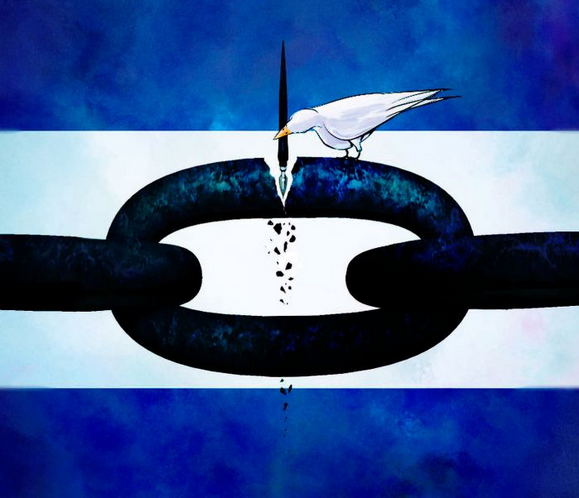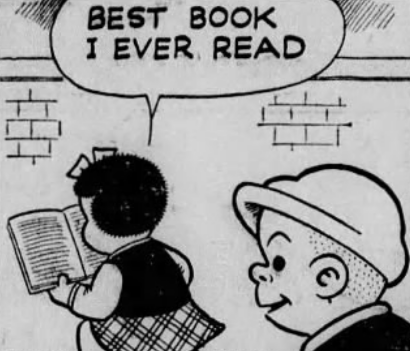CSotD: Independence Day wrap-up
Skip to commentsConstant Readers know how strongly I identify with Arlo and Janis (AMS), and certainly I do on this strip. It’s been not just years but decades since I’ve gone to a fireworks display, though they were important back when I had young kids with whom to ooh and aah.
Even then, we were happy to take advantage of a party at the house of some people who lived on a hilltop near the fireworks venue. We not only had an unrestricted view, but didn’t have to fight our way through the crowd at the park.
So this isn’t just an issue of growing old. I’ve been a curmudgeon all my life.
Last night we had an early thunderstorm, neighbors with firecrackers and the city’s display, none of which mattered to the dog, though, like the pup in this morning’s Bliss (Tribune), she’d have taken interest in a car alarm if it were next door.
But while booms in the distance didn’t faze her, she wouldn’t have found my reading poetry to her as enthralling as anything happening just outside the window.
She has a tendency to live in the moment.
So I read to myself and she snoozed and we somehow got through what has been widely promoted as a night of Hell for pups and their owners.
The folks at Peanuts republished this classic, and I’m not sure where Charlie Brown lives that people blowing off firecrackers is something from “years ago” because it’s always been right now anywhere I’ve lived.
Perhaps he means “on the Fourth of July,” that, years ago, they only did it on the Fourth, and then stopped until New Years.
But still, like the folks in today’s Grand Avenue (AMS), I’ve never lived in a place where people blowing off firecrackers was limited to the Fourth.
Come to think of it, while I understand not being able to wait for the Fourth to test a few, I don’t know why anyone would have leftovers to blow off after that, unless maybe they had passed out before they exhausted their stash.
Which is entirely possible, and probably safer.
Anne Hambrock has a feature called “Anne and God” in which she reproduces the thoughts she shares with the Almighty, or possibly just with herself, as she tries to make sense of the world. The newest episode includes thoughts about that extended firecracker holiday.
Her description of having to dig a stuck dog out from under the bed made me laugh but makes me more sympathetic to people whose dogs freak out over fireworks.
I’ve had 13 dogs but only two of them cared about fireworks. One simply cuddled close and trembled until it was over, but the other would vomit, which was messy but useful, since he’d also signal approaching thunderstorms before we could hear them.
As Clay Jones points out, however, not all that goes bang is fireworks, and it’s too bad we don’t have dogs who could give you advance warnings of a mass shooting.
We did get all sorts of warnings about not scaring dogs and not blowing off your fingertips on July 4, but they forgot to warn people in Philadelphia, Fort Worth, Washington, Salisbury MD, Baltimore or Mattapan MA, not to stand in front of armed lunatics.
Well, just as long as nobody scared any dogs or shot off anyone’s fingertips.
Juxtaposition of the Holiday
Ramirez offers an unusually frank historical assessment, reminding us that the Revolution was something of an upper middleclass movement, or at least that its top leadership was largely comprised of wealthy men who were not particularly interested in the problems of the less fortunate, even those whom they did not own outright.
If you study the Revolution, you’ll find a few salt-of-the-earth types like John “Live Free or Die” Stark, who was very good at fighting the British but grew tired of fighting with the Continental Congress and resigned his commission to let the overstuffed pinch-penny dandies in Philadelphia quarrel amongst themselves.
Though at least he didn’t get so entangled in their childish nonsense that they eventually drove him over to the other side, as happened with the hero of Saratoga.
By contrast, Washington was a wise leader and a good president, but, as Ramirez suggests, he was still a wealthy planter at heart and it’s hard to make the case that he took a great deal of interest in the problems of the lower classes, though he did free his slaves in his will.
But when farmers and unpaid veterans in Massachusetts rose up in Shay’s Rebellion, Washington was in favor of clamping down on them in order to preserve the government’s authority. No government handouts for them!
That was the moment of which Jefferson wrote that a little uprising now and then was a healthy thing, and, as noted in Prickly City, he took some abuse for his attitude then and, for all their performative rah-rah revolutionary fervor, he wouldn’t likely fare much better under current pressure groups.
Specific to student debt, Washington did little to advance public education, while Jefferson requested that the three things memorialized on his tombstone would be authorship of the Declaration of Independence and of the Statue of Virginia for Religious Freedom, and his establishment of the University of Virginia, the latter as part of his deep belief that education was necessary for the proper functioning of a democracy.
He also championed establishment of free elementary education in Virginia, as part of that oft-half-quoted remark about an informed electorate:
His university was hardly perfect, and part of its shortcoming was that it was elitist. As part of his vision, I’m sure he’d have been happy to see tuition no longer a barrier for attendance.
Granted, Jefferson did other things he likely wouldn’t want to be remembered for, if he lived today in today’s world.
And, BTW, in setting up UVA, Jefferson made other steps that would have infuriated the MAGA crowd, and perhaps 67% of the Supreme Court, refusing to establish a theology department or let religion be any part of the education offered there, in keeping with that statute on religious freedom he also wanted to be remembered for.
I haven’t read about any perfect people in my studies of history. Some come closer than others, and, unfortunately, some reflect our ideals while others reflect their reality.
To that extent, I think both cartoonists got this one right.
But one of those Founders wrote the Declaration; the other only had to defend it.
Study your history!













Comments 13
Comments are closed.